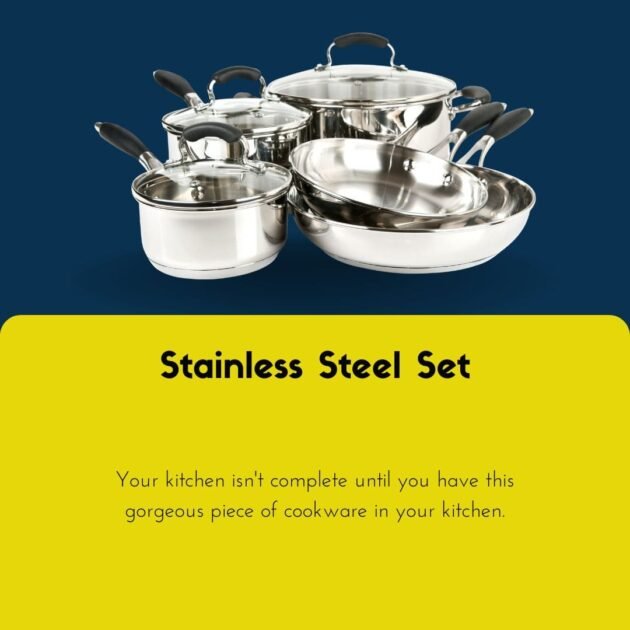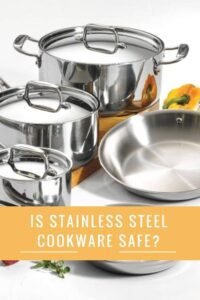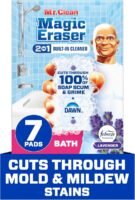Aluminum and stainless steel cookware are popular choices, but which one is better? Aluminum cookware is inexpensive, heats up quickly, and is lightweight, but it can be challenging to clean and may not work on induction stoves.
On the other hand, stainless steel cookware is durable, nonporous, and offers various options, but it can be more expensive and may not heat up as quickly. Ultimately, deciding between aluminum and stainless steel cookware depends on your needs and preferences.

Pros And Cons Of Aluminum Cookware
Aluminum is a popular option when choosing cookware for your kitchen, with advantages and disadvantages. Understanding the pros and cons of aluminum cookware can help you make an informed decision. Let’s take a closer look at the advantages and disadvantages of aluminum cookware.
Advantages Of Aluminum Cookware
Aluminum cookware comes with several advantages that make it a preferred choice for many chefs and home cooks:
- Rapid and Even Heat Distribution: Aluminum is an excellent conductor of heat, ensuring that your food cooks evenly and quickly.
- Lightweight: Aluminum cookware is lightweight, making it easy to handle and maneuver in the kitchen.
- Affordability: Aluminum cookware is relatively inexpensive compared to other materials like stainless steel or copper.
- Non-Reactive: Unlike some other materials, aluminum is non-reactive, which means it won’t interact with acidic or alkaline ingredients, preserving the taste and quality of your food.
- Quick Heating and Cooling: Aluminum pans heat up and cool down rapidly, allowing for precise temperature control during cooking.
- Easy to Clean: Aluminum cookware is generally easy to clean by hand or in a dishwasher.
Disadvantages Of Aluminum Cookware
Although aluminum cookware has its advantages, it also comes with a few drawbacks that you should consider:
- Durability: Aluminum pans can be prone to scratching, affecting their durability over time. Scratches can also create grooves that trap food particles and bacteria, making them more challenging to clean.
- Reactivity: Aluminum can react with certain foods, especially those that are acidic or salty. This reaction can affect the taste and appearance of the food.
- Not Induction Compatible: Pure aluminum is not magnetic, so it won’t work on induction cooktops without an induction-compatible base.
In conclusion, aluminum cookware offers rapid and even heat distribution, affordability, and non-reactive properties. However, it may not be as durable as other materials like stainless steel and can have reactivity and induction compatibility issues. Considering the pros and cons can help you decide if aluminum cookware is the right choice for your kitchen.
Pros And Cons Of Stainless Steel Cookware
Stainless steel cookware offers the advantage of being safe to use in the oven and heating up quickly, but it can be difficult to clean and may not work on induction stovetops. On the other hand, aluminum cookware is inexpensive and heats up fast, but it can scratch easily and react with certain foods.
Stainless steel cookware is popular with many home cooks and professional chefs. It offers a range of advantages and disadvantages that should be considered when deciding on the best cookware for your needs.
Advantages Of Stainless Steel Cookware
| Advantages |
|---|
| 1. Durability and Longevity |
| 2. Non-reactive Surface |
| 3. Versatility |
| 4. Stylish Appearance |
Stainless steel cookware is known for its durability and longevity. It is resistant to scratches, dents, and stains, making it suitable for everyday use. Additionally, its non-reactive surface ensures no flavors or odors are transferred to the food, preserving the natural taste. This makes stainless steel ideal for cooking many dishes, including acidic or salty foods. Moreover, stainless steel cookware is known for its sleek and stylish appearance, adding a touch of elegance to your kitchen.
Disadvantages Of Stainless Steel Cookware
- 1. Poor Heat Conductivity
- 2. High Price
- 3. Requires Proper Maintenance
- 4. Can Be Heavy
One of the significant disadvantages of stainless steel cookware is its poor heat conductivity. Stainless steel alone does not distribute heat evenly, resulting in hot spots and uneven cooking. To overcome this, many stainless steel cookware pieces have an aluminum or copper core to improve heat distribution.
Another consideration is the higher price of stainless steel cookware than other materials. While it is a long-term investment due to its durability, it may not suit those on a tight budget.
Stainless steel cookware also requires proper maintenance to keep it looking its best. It can show water spots or discoloration if not dried properly after cleaning. Additionally, the weight of stainless steel cookware can be a drawback for some individuals, especially those with limited strength or mobility.
In summary, stainless steel cookware has numerous advantages, including its durability, non-reactive surface, versatility, and stylish appearance. However, its poor heat conductivity, higher price, maintenance requirements, and weight can be considered disadvantages for some users. It is essential to weigh these factors against your cooking needs and preferences to make an informed decision.
Frequently Asked Questions About Aluminum vs. Stainless Steel Cookware: Which Is Better?
What Are The Disadvantages Of Aluminum Cookware?
The disadvantages of aluminum cookware are that it can be easily scratched, affecting its durability and making it harder to clean. Aluminum can also react with certain foods, especially acidic or salty ones.
Why Do Chefs Use Aluminum Pans?
Chefs use aluminum pans because they heat up quickly and cool down fast, making them ideal for fast-paced cooking. Aluminum is also a good conductor of heat, ensuring even cooking and precise temperature control. However, aluminum pans can scratch easily and react with certain foods.
What Metal Makes The Best Cookware?
Stainless steel is the best for cookware due to its durability and attractive appearance. It conducts heat evenly, minimizing hot spots and providing precise temperature control for fantastic cooking results. Aluminum, on the other hand, may scratch easily and react with certain foods.
What Are The Benefits Of Aluminum Cookware?
Aluminum cookware offers fast and even heat distribution, minimizing the risk of hot spots for precise temperature control. This results in fantastic cooking results. However, aluminum pans can scratch easily and react with certain foods.
Conclusion
Overall, aluminum and stainless steel cookware have advantages and disadvantages. Aluminum cookware can be inexpensive and heat up quickly, but it may be harder to clean and unsuitable for induction cooktops. On the other hand, stainless steel cookware is durable and versatile but can be more expensive.
Ultimately, choosing aluminum or stainless steel cookware depends on personal preference and cooking needs. Whether you prioritize affordability, heat conductivity, or durability, there is a cookware option that will suit your needs.

I have been working as an SEO Expert in Bangladesh for a long time and now providing the best SEO Service in Bangladesh. With the approach to Semantic SEO that eschews superfluity. Jahan





